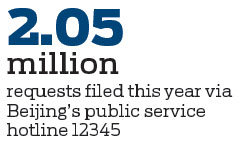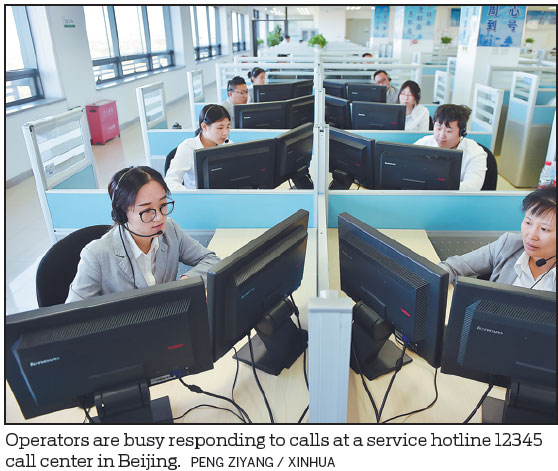Helpful hotline evolves to better serve, improve livelihood of residents
Beijing is seeking to use innovation in achieving its long-term goal to continuously improve people's social welfare, said local officials.
A public service hotline, 12345, was created in 1987 with the aim of making it easier for people to solve basic problems in their lives, such as noise complaints and circuit maintenance.

To enhance efficiency and bring more benefits to residents, the city government made changes to the long-running hotline in January.
Now, after receiving requests or complaints, the hotline will immediately classify them and assign them to relevant township-level offices.
Moreover, sub-district offices must ensure there are operators on duty 24 hours a day for the hotline. The time limit for resolving appeals has been shortened from 15 working days to seven days.
Zhang Bo, director of the city government's service telephone center, said the hotline can dispatch orders to 328 township-level administrative regions in Beijing.
All regions are assessed every week on their response rate, resolution rate and satisfaction rate.
Hotline operators will give a return call to residents who have lodged a complaint or request to see whether it has been resolved in time and satisfactorily. The case will not be closed until they are satisfied, officials said.
"Both the processing speed and effect have been improved greatly after reform," Zhang said.
This year, the hotline has received 2.05 million requests so far and every appeal has received a reply.
The resolution rate increased from 53.09 percent in January to 74.36 percent in October while the satisfaction rate has also grown by 32.19 percentage points during the period.
Since October, a service designed for enterprises was added to the hotline.
"The service is a new measure to promote enterprises' development in Beijing and enhance the city's business environment," said Zhou Xu, director of the Beijing Investment Promotion Service Center.
Education has also been a major part of Beijing's improved social welfare sector, and great strides have been made in this area.
Last year, more than 96 percent of primary school students were able to receive schooling close to their home. As for junior high school students, 99 percent were schooled close to home.
Covering urban and rural areas, nearly 130 school blocks and 150 educational groups in Beijing have met the expectations of most children to attend school nearby, said Li Yi, deputy director of the Beijing Education Commission, adding that the city has provided a model for the balanced development of basic education in China.
With growing problems rising from an aging population, the city government has committed to offering assistance and quality services to senior citizens.
Statistics show that the city's special fund for elderly care has increased from 520 million yuan ($73.86 million) in 2012 to 1.38 billion yuan in 2019, rising 165.4 percent.
To date, 755 community nursing service stations have been built for elderly people in Beijing. The number is estimated to exceed 1,000 by 2020.
zhanglinwan@chinadaily.com.cn

(China Daily 11/27/2019 page6)














